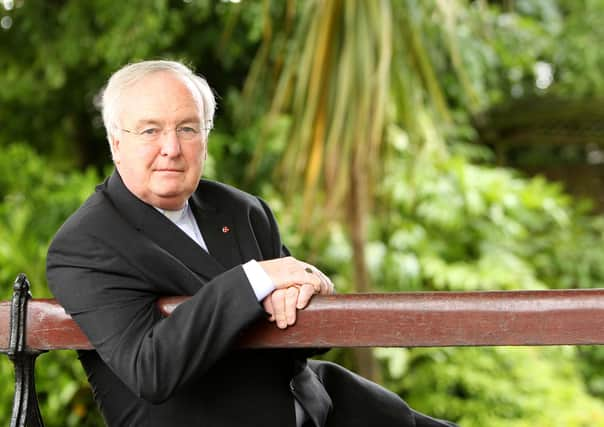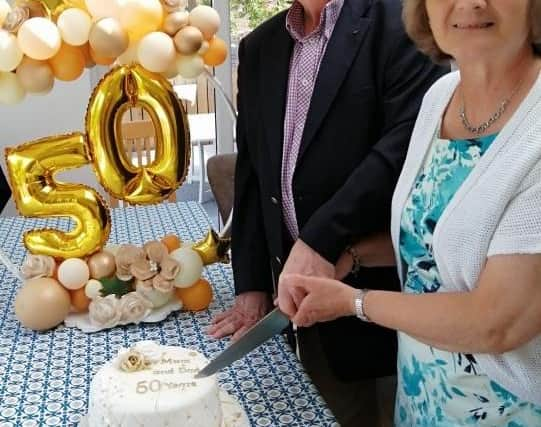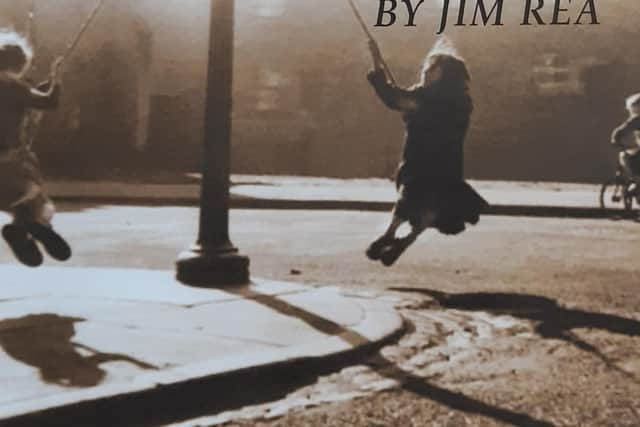Former Methodist minister Jim Rea surprises himself with second book


Just last year Jim published a book of stories gathered over his years in the ministry – a thoughtful, entertaining and poignant mix of real life tales entitled ‘Stories From The Streets’.
His memory banks drained Jim pondered a new project, then came lockdown and suddenly more stories that had been buried deep in his mind’s recesses started to flow. It was time for another book.
Advertisement
Hide AdAdvertisement
Hide AdHe said: “I didn’t really think I had a second book in me but I was put into lockdown and I was isolating until July 31 and I thought maybe I’ll start writing more stories.


“Whatever kind of mind I have I just tend to be able to reflect back on something and see a story. I’ve never written these down anywhere. They’re stored in my head, sometimes something can just trigger a story and it comes back to me.”
Jim Rea was elected president of the Methodist Church in Ireland in 2003, prior to being awarded an MBE in 1995 for services to the community.
For 21 years he worked on the Newtownards Road.
He is a regular on BBC Radio Ulster’s Thought For The Day and Downtown’s Just A Moment as well as writing a religious column in the News Letter.
Advertisement
Hide AdAdvertisement
Hide Ad

In 2014 portrait featured in a ‘Quiet Peacemakers’ art exhibition by Susan Hughes.
Jim said some of these new stories were very personal and required anonymity: “I was always fearful that some of the stories I’d put into this new book would require a changing of names because of anonymity. I did that.
“I kept pressing on with it, I got encouragement to do it, I thought it’s something positive to do when you’re locked down in the house.
“It’s a book for a light reader. Hopefully the stories are inspirational – they’re sad sometimes, humorous on other occasions.
Advertisement
Hide AdAdvertisement
Hide Ad“Everything in that book is absolutely 100% true. There’s a story of a lady who was in the hospital and came to see me in 2011 to tell me I’d prayed with her when she’d taken an overdose and was pregnant. It took her 41 years before she came to see me.
“There is the story of Gordon Wilson that will strike a chord. There’s the story of the wee boy Paul Maxwell who was killed on the boat with Lord Mountbatten.
“I’m 75 years of age, I’m thinking for the sake of antiquity to write these stories down.”
Jim worked on the Newtownards Road for 21 years where he founded the East Belfast Mission in 1985.
Advertisement
Hide AdAdvertisement
Hide AdHe was later stationed in Portadown and was involved in mediation to diffuse the impasse at Drumcree.
“I’ve been in all sorts of difficult situations,” said Jim, who worked almost exclusively in conflict areas during the Troubles and witnessed some of its most horrific events.
“I was ministering through the worst of the Troubles and experienced the death and destruction that was happening on all sides.”
Jim writes about the late SDLP leader John Hume and an encounter with cricket umpire Dickie Bird, but he believes it is important that the stories of unsung heroes like Rev Sam Burch are committed to our social history: “Sam Burch was a very low key player in the whole peace business but was very important. I thought, nobody has ever written about Sam Burch to say how that guy did so much in such a quiet way.
Advertisement
Hide AdAdvertisement
Hide Ad“I think that when I pass on people will read these stories and they’ll be part of history. Maybe not academic history, but social history.”
Jim commented: “My central purpose in writing these two books is to share the truths of the Gospel through these true stories, and also to honour the memory of some remarkable people I have met, some of them well-known and some hardly known at all.
“My aim will have been achieved if the stories help readers realise what it means to follow Jesus and experience the greatest hope of all – the wonder of life that never ends and continues in the new heaven and new earth, where there will be no sorrow, sadness or pandemics.”
Well known through his articles in the News Letter and as a radio personality, Jim said when you become a public figure you have to learn to take the rough with the smooth: “I was doing a Thought for the Day on Radio Ulster. I said something along the lines of, ‘God loves you, no matter whether you live in Belfast or Ballymena, Portadown or Portaferry, Dungannon or Divis Flats. You could see the point I was making.
Advertisement
Hide AdAdvertisement
Hide Ad“Anyway, I got a letter from a woman who said, ‘how dare you compare Dungannon where I live with Divis Flats?’”
During lockdown Jim and his wife Carol celebrated their 50th wedding anniversary: “Not bad going I suppose. I don’t know where I’d be without her.”
Jim said his second book came together faster than his first despite ‘starting from scratch’.
He said: “I started writing it in February and finished at the end of September. I’ve got people to read the stories and edit them because to be honest I make so many mistakes. I’m very aware of my own inabilities. I need someone to keep me right. The glaring mistake I saw after the book was published was the Latin ‘Quis Separabit’ was wrongly spelt.”
Advertisement
Hide AdAdvertisement
Hide AdHe continued: “The first book came out of a lot of the stories I’d written for Billy Kennedy for the News Letter. There were all those News Letter ones to draw on. On this occasion I was having to write relatively new stories so I didn’t have as many to pull back on. I was starting from scratch. Yet I finished it much faster than the first book.”
His first book allowed the Belfast man to make a sizeable donation to charity: “The profits from ‘Stories From The Street’ have allowed me to contribute a total of £10,000 to the Welcome Organisation and East Belfast Mission’s Hosford House, both charities for the homeless.”
A story from the book:
One day the funeral director called me and asked me to conduct the funeral of a man called Alan Short. As always I would talk to the family to get to know something about the deceased.
When I arrived at the home I was told I should refer to the deceased as Shortie even though he was six foot three. It was also important to mention his fanatical support for Rangers Football Club.
Advertisement
Hide AdAdvertisement
Hide AdThey went on to tell me that he was a dedicated member of a South Belfast loyalist flute band, and I was assured most of the band would attend. I took copious notes, hoping that I could do my best at the funeral at Roselawn Crematorium. I got the impression that Shortie was a big character who had an influence for good on the band.
When we got to the crematorium a young man with a strong Glaswegian accent approached me, introducing himself as Brian. He said he would like to say a word about Shortie on behalf of the band. “I will say nothing to offend you, Reverend, in fact, I will quote scripture.” So I agreed. When I invited Brian to speak, some of his reflections on Shortie brought laughter. And then, true to his word, it came: “Shortie always told me that Rangers were mentioned in the Bible. Psalm 95 verse 7.
WE ARE THE PEOPLE the sheep of his pasture.
I couldn’t help but smile. ‘We are the people’ is commonly used by Rangers fans to express their supremacy. Not so terribly in recent years!
Then I had to speak. “Thanks Brian, what a great play on words.” I then told the large number gathered that I wanted to speak on the words “no surrender.” Suddenly I had a captive audience eating out of my hand.
Advertisement
Hide AdAdvertisement
Hide AdI paused and then went on, “I spell it differently. I spell it as K-N-O-W surrender.” And I explained that the most important thing they could do was to surrender their lives to Jesus Christ. I explained how they might take that step. One wee man going out shook my hand warmly and said it was the best funeral he had ever been at, a bit over the top I thought. However I don’t know of the long term impact, but I still pray that God may use those words, rather impromptu, or as they say in these parts, “on the hoof”.